
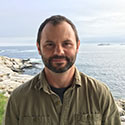
Associate Professor, Temple University
Erik Cordes is an Associate Professor and Vice Chair of the Department of Biology at Temple University. He received his Master’s degree from Moss Landing Marine Labs on Monterey Bay, his Ph.D. from Penn State University and was a post-doctoral fellow at Harvard University. He has worked on the ecology of the deep sea for over 20 years, spending over a year at sea on 31 research cruises and making 46 dives in manned submersibles. His work is centered around the ability of organisms to shape their environment and increase biodiversity, but has increasingly become focused on the impacts of humans in the deep sea. Dr. Cordes is among the Pool of Experts for the ongoing UN World Ocean Assessment, the Chair of the Oil & Gas Working Group of the Deep Ocean Stewardship Initiative, and on the Board of Directors for a non-profit conference center in New Hampshire. Some of his recent work can be found here: https://sites.temple.edu/cordeslab/ .
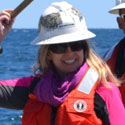
Research Benthic Ecologist, U.S. Geological Survey
Amanda Demopoulos is a Research Benthic Ecologist for the U.S. Geological Survey (USGS) at the Wetland and Aquatic Research Center in Gainesville, Florida. She received a B.S. in Oceanography from the University of Washington, and M.S. and Ph.D. in Biological Oceanography from the University of Hawaii at Manoa. After completing a post-doctoral fellowship at Scripps Institution of Oceanography, she obtained her current position at USGS, where she conducts research on the community ecology of coastal wetlands, shallow and deep-sea coral reefs, and seeps. She has been conducting benthic ecological studies for over 20 years, examining the community structure and function of animals found in sediments, or infaunal benthos, and characterizing energy flow (food) through different environments. To date, she has participated in 35 offshore expeditions, and dived in submersibles 13 times, plus worked with several other deep-sea ROVs and AUVs. For this project, she serves as the project chief for the USGS team scientists, helping coordinate the USGS research with the TDI Brooks team, BOEM, and NOAA. Her specific research focuses on examining the community ecology and food webs within and among seeps, corals, and canyon environments. For this expedition, she will serve as Chief Scientist of leg 2. Her team will be collecting sediments using the ROV Jason (push cores) and from the ship (multicore and monocore) to characterize the infaunal communities. She will also be dissecting tissue samples and filtering water for stable isotope analysis to identify food-web linkages and energy transfer in these deep-sea environments.
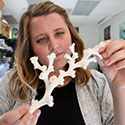
PhD Candidate, Temple University
Alexis is a PhD candidate in Erik Cordes’ lab at Temple University. Much of her research involves understanding how humans are influencing deep-sea coral communities. To better understand this, she is conducting multiple-stressor experiments exposing Lophelia pertusa colonies to various levels of pH, temperature, and oil-dispersant mixtures. Assessments of coral health are recorded during and after exposures by examining both the physiological and transcriptomic response. Before starting her PhD at Temple University, Alexis completed a M.Sc. in Ecology, Evolution, and Conservation Biology at San Francisco State University and the California Academy of Sciences. Her first experience with marine research was at Florida Institute of Technology, where she earned a B.Sc. in Biological Oceanography. On the DEEP SEARCH project, Alexis is the acting data manager and is managing the collection and maintenance of live Lophelia pertusa colonies for in-lab experiments at Temple University.
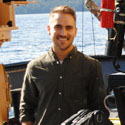
PhD Candidate, Temple University
Ryan Gasbarro is a Ph.D. student in Erik Cordes’s lab at Temple University. His research involves the distribution of the framework-forming coral Lophelia pertusa and the ecology of the diverse animal communities in the DEEPSEARCH study areas. He primarily uses a combination of habitat suitability modeling and various community analyses from video imagery and bottom samples to answer questions about how biodiversity is structured in these deep-sea ecosystems. Before joining the Cordes lab, Ryan undertook M.Sc. research detailing biodiversity patterns in British Columbian fjord benthos related to physical oceanography and low-oxygen events. After receiving his Master's, Ryan did some work in a hydrothermal vent system mapping biogenic habitat and identifying suitable areas for deep-sea camera deployments. On this expedition, Ryan will mostly be processing community collections and water samples, and he is excited to spend a lot of time watching video of the seafloor!
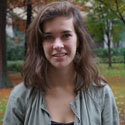
Research Assistant, Temple University
Abby Keller is a research assistant in the Cordes Deep Sea Ecology lab at Temple University in Philadelphia, PA. She will primarily be focused on analyzing the water chemistry in deep-sea habitats and in the water column. This is her third research cruise and her first in the Atlantic! She holds a Bachelor's Degree in Biology from Haverford College and plans to pursue a graduate degree in marine biology or coastal resource management.
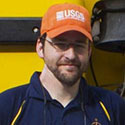
Research Geologist, U.S. Geological Survey
Jason Chaytor is a research geologist with the U.S. Geological Survey (USGS) at the USGS Woods Hole Coastal and Marine Science Center. Jason graduated from Queensland University of Technology (Brisbane, Australia) in 2000 with a first-class honours degree in Geology, completed his Ph.D. in Geological Oceanography at Oregon State University in 2006, and was a postdoctoral scholar at Woods Hole Oceanographic Institution between 2006 and 2009. Jason conducts research on issues related to marine geohazards including submarine landslides, tsunamis, earthquakes, and plate tectonics and shallow- and deep-water sedimentary processes on Atlantic, Gulf of Mexico and Pacific margins of the U.S. and in the northeast Caribbean. He is the current principal scientist for the USGS Woods Hole Coastal and Marine Science Center Sediments Laboratory.
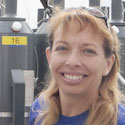
Research Microbiologist, U.S. Geological Survey
Christina Kellogg is a Research Microbiologist at the U.S. Geological Survey (USGS) at the St. Petersburg Coastal and Marine Science Center in St. Petersburg, Florida, where she leads an environmental microbiology laboratory specializing in coral microbial ecology. She has been working in deep-sea coral ecosystems since 2004 and considers herself extremely lucky to have had the privilege of visiting them personally in the Delta and Johnson-Sea-Link submersibles. She is currently serving as a judge for the $7-million Shell Ocean Discovery XPRIZE competition, the goal of which is to accelerate development of autonomous deep-sea mapping and sensor capacity. Dr. Kellogg holds a Ph.D. in Biological Oceanography from the University of South Florida and a B.S. cum laude in Biology from Georgetown University. Her current research involves characterizing deep-sea coral microbiomes and deep-sea benthic habitats, both in terms of determining ‘who’s there’ and ‘what are they doing’ to provide critical new baseline datasets. During the mission, Chris will collect coral tissue samples to determine their microbiomes and water samples for metagenomic analysis of coral mound, seep, and soft sediment habitats. When not at sea or in the lab, her interests include stained glass, science fiction, colored gemstones, and the music of 80’s big hair bands.
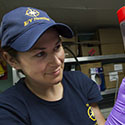
Biologist, U.S. Geological Survey
Jennifer McClain-Counts is a biologist at U.S. Geological Survey’s Wetland and Aquatic Research Center in Gainesville, FL. Jennie received her B.S. degree in Marine Biology (2006) and her M.S. degree in Marine Science (2010) from the University of North Carolina Wilmington. She is interested in the use of stable isotopes to elicit trophic relationships and currently works with Amanda Demopoulos (USGS - WARC) to examine trophic and community structure of marine fauna collected in various habitats, such as wetlands, offshore wrecks, deep-sea coral, chemosynthetic communities and submarine canyons. During the cruise, Jennie will assist with processing sediment cores, water samples and processing tissue samples for stable isotope analyses. Jennie is excited to be working with the ROV Jason and its team again as well as connecting with her fellow researchers. She cannot wait to see what interesting things will be discovered during this expedition!
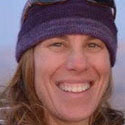
Oceanographer, U.S. Geological Survey
Nancy Prouty is an oceanographer at the USGS Pacific Coastal and Marine Science Center in Santa Cruz, CA. She received her Ph.D. at Stanford University in the Oceans Programs in 2004 after earning a M.S. at the University of New Hampshire. Her scientific background includes atmospheric chemistry, oceanography, and climate change. Using geochemical signals preserved in “natural recorders” (e.g., ice cores and coral records) of climate variability, Nancy has focused her research on enhancing our understanding of climate variability on human-relevant timescales and impact of human activities on the climate. Her training includes a postdoctoral position at the Woods Hole Oceanographic Institution (WHOI). She joined the U. S. Geological Survey in 2006 as a Mendenhall Fellow as part of the Ridge-to-Reef studies in Hawaii. She is a research oceanographer as part of the Coral Reef Project, and is a member of the Diversity, Systematics, and Connectivity of Vulnerable Reef Ecosystems (DISCOVRE) team. Nancy’s geochemical analytical research at the USGS has focused on the effects of understanding both present and past effects of climate changes on coral reef ecosystems, both shallow water and deep-cold water coral ecosystems.
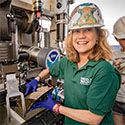
Research Geneticist, U.S. Geological Survey
Cheryl Morrison is a Research Geneticist at the U.S. Geological Survey (USGS) Leetown Science Center in Kearneysville, West Virginia. She received a B.S. in Marine Biology from the University of North Carolina at Wilmington (1991), and a PhD from Florida State University in Biological Sciences (1997). Cheryl is interested in marine biodiversity and how diversity is generated and maintained through life history traits and the physical oceanographic conditions that organisms experience. She has been studying cold water coral ecosystems for over a decade in the Gulf of Mexico, Atlantic and Pacific Oceans, and has participated in 26 research cruises using submersibles and ROVs to explore and characterize benthic habitats. Her current research involves the utilization of genetic and genomic techniques to aid in the study of biodiversity, population, and community structure at vulnerable deep-sea habitats (deep-sea corals, cold seeps and canyons). During the mission, Cheryl will take tissue samples that will be utilized back in the laboratory for DNA barcoding to aid in species identification as well as connectivity studies for select, abundant corals. She will also take water samples for metabarcoding studies to characterize little-known eukaryotic plankton biodiversity, distribution patterns, and ties to benthic food webs.
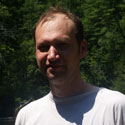
Biologist, U.S. Geological Survey
Aaron Aunins is a biologist in the laboratory of Cheryl Morrison, USGS Leetown Science Center, WV. He graduated from the Virginia Institute of Marine Science with his M.S. in Marine Science in 2006, and completed his Ph.D. in Integrative Life Sciences at Virginia Commonwealth University in 2011. At VIMS, Aaron studied the migration and spawning behavior of American shad in the James River, and at VCU he investigated the impacts of American shad hatchery supplementation on population genetic structure throughout Chesapeake Bay tributaries. Aaron has been working at the Leetown Science Center since 2013, and has worked on a wide range of genetics and genomics projects including metapopulation structure in brook trout, mitogenomic sequencing of a variety of organisms including diatoms, amphipods, and butterflies, population genetics of tiger beetles, high throughput genotyping of Atlantic sturgeon SNP loci, and eDNA surveys of aquatic biodiversity in Great Smoky Mountains National Park using metabarcoding. Aaron just recently joined Cheryl Morrison’s lab, and is excited to apply his genetics and genomics experience to research in the marine environment, such as eDNA metabarcoding of taxa in the deep scattering layer.
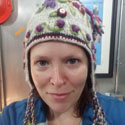
Marine Benthic Ecologist, U.S. Geological Survey
Jill Bourque is a marine benthic ecologist in the Benthic Ecology Lab at the U.S. Geological Survey's Wetland and Aquatic Research Center in Gainesville, FL. She received a B.S. in marine science and biology from Rider University (2002) and a M.S. (2005) and Ph.D. (2009) in marine bioscience from the University of Delaware's College of the Earth, Ocean, and Environment. She specializes in taxonomic identification and benthic community analysis of invertebrates from coastal and deep-sea habitats, including deep-sea corals, canyon systems, cold seeps, trenches, seamounts, mangroves, and worm reefs. Her research interests include community ecology and ecosystem function of coastal and deep-sea habitats, focusing on the local and regional biodiversity associated with structural habitats and their connectivity to adjacent areas. As part of the DEEP SEARCH program, she will be examining the macrofauna living within sediments collected near deep-sea corals and in seep and canyon habitats to investigate the effects of sediment geochemistry and food supply on structuring these communities, and their connectivity along the Atlantic margin.
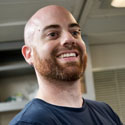
Engineering Technician, U.S. Geological Survey
Jonathan Quigley graduated with a B.S. in Journalism from the University of Florida and works as an engineering technician in the Benthic Ecology lab at the U.S. Geological Survey (USGS) Wetland and Aquatic Research Center in Gainesville, Florida. After 6 years running a small local business that provided database development and web programming, Jonathan has shifted focus to pursue his passion for marine sciences. More than twenty years of experience with aquariums fueled his love for aquatic life, especially marine fish and coral husbandry. This background and his entrepreneurialism afforded him the opportunity to volunteer in the Benthic Ecology lab for several years, gaining hands-on experience before being brought on full-time. During this cruise, his second, Jonathan will be assisting with the processing of sediment cores, collecting tissue samples for stable isotope analysis and providing support to researchers.
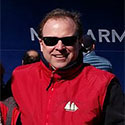
Geographer, U.S. Geological Survey
Brian Andrews is a geographer with the Seafloor Mapping Group at the US Geological Survey, Woods Hole Coastal and Marine Science Center, Woods Hole, MA. His work focuses on the collection, processing, and analysis of high-resolution marine geophysical survey data. During this project, he will be managing all the spatial data collected from the various sensors on the Ron Brown and ROV Jason. He graduated from Ohio Wesleyan University with a degree in Physical Geography and completed his Master’s Degree in Geography/Coastal Geomorphology at East Carolina University. In addition, Brian is a former professional mariner on sail training vessels and holds Master/Mate licenses from the US Coast Guard for vessels up to 200 tons (Near Coastal) and 1,600 tons (oceans).
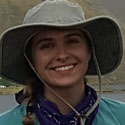
Geologist, U.S. Geological Survey
Allyson Boggess graduated in 2017 with a B.S. in Geology from James Madison University in Virginia. She works with Jason Chaytor in the sediment lab at the U.S. Geological Survey at the Woods Hole Coastal and Marine Science Center in Woods Hole, MA. She is looking forward to her first research cruise and learning more about marine field work!
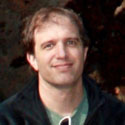
Marine Ecologist, Bureau of Ocean Energy Management
Michael Rasser is a Marine Ecologist for the Bureau of Ocean Energy Management. He received a B.A. in Environmental Studies from Florida International University (2000), an M.S. (2003) in Forest Resource and Conservation (Minor: Wildlife Ecology) from the University of Florida and Ph.D. (2009) in Marine Science from the University of Texas at Austin. Mike’s areas of expertise include landscape and community ecology, and the use of geographic information systems (GIS) and remote sensing as tools for environmental monitoring, mapping and analysis. Michael Rasser serves as the national headquarters marine ecologist in the BOEM Environmental Studies Program overseeing the development, planning, and coordination of applied marine ecology studies.
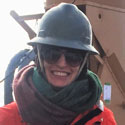
Marine Biology, Bureau of Ocean Energy Management
Katherine 'Kate' Segarra is a marine biologist with the Department of the Interior's Bureau of Ocean Energy Management (BOEM). As a staff scientist for BOEM's Office of Environment in the Gulf of Mexico Regional Office, Kate provides expertise on the potential biological impacts of energy and marine mineral development on the outer continental shelf. Kate holds a Ph.D. in Marine Sciences from the University of Georgia. Her dissertation in microbial biogeochemistry was focused on carbon cycling in coastal wetlands and deep-sea sediments. Previous NOAA OER cruises have taken her to the middle of the Gulf of Mexico and the Arctic Circle. A Gulf Coast native, Kate enjoys spending time on or near water, soccer, traveling, and city life.
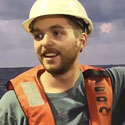
Masters Student, University of New Hampshire
Dylan Wilford is a Masters student in Oceanography at the University of New Hampshire. His research is focused on characterizing and quantifying soundscapes across a range of habitat types using passive acoustic monitoring. Dylan received his B.S. in Facilities Engineering from Massachusetts Maritime Academy in 2014 and went on from there to work for several years at Siemens Building Technologies as a Design Engineer. An avid surfer and bibliophile, marine science was an obvious choice and Dylan thoroughly enjoys collaborating with scientists any chance he can get. On this cruise, Dylan will be deploying a hydrophone on one of the landers that will record on a duty cycled interval until retrieval.
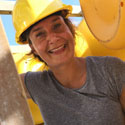
Research Scientist, NIOZ - Royal Netherlands Institute for Sea Research
After finishing a PhD studying environmental conditions that influence cold-water coral growth and reef formation, Furu Mienis is currently working as a tenure track scientist at the NIOZ Royal Netherlands Institute for Sea Research. The main focus of her research is to study near-bed environmental constraints that influence often vulnerable deep-sea ecosystems, bridging the fields of physics, ecology and geochemistry. The deep-sea is in general a food limited environment and we try to resolve how oases of life in the deep sea (e.g. cold-water coral and sponge reefs) can sustain themselves. Besides reef systems her research at present focuses on the study of submarine canyons and their role in transport of carbon. In parallel to her more fundamental research, Furu Mienis works on the technical development of deep-sea landers, which resulted in several new observational and autonomous sampling tools. These landers can be deployed for several days up to a year and can measure a large variety of (physical) factors as well as record time lapse video data. Lander data will allow us to show daily-seasonal variability in the deep-sea, allowing us to define why these systems can sustain themselves in a food deprived deep-sea.
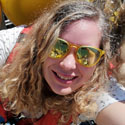
PhD Candidate, NIOZ - Royal Netherlands Institute for Sea Research
Sofia is a graduate student under Furu Mienis at the in the Department of Ocean Systems at the NIOZ - Royal Netherlands Institute for Sea Research. She received her M.Sc. in Marine Biology at Stockholm University focusing on deep sea ecology and is currently conducting her PhD in the same field working on project BYPASS. The unknown role of submarine canyons—pathways or sinks for organic carbon. Sofia’s research is mainly focused on exploring fauna’s role, from micro to mega fauna in submarine canyons. Linking habitat variation with faunal patterns to explore their potential use as proxies for organic matter availability and mineralization in canyon systems by utilizing interdisciplinary methods and integrating microbial data, eDNA and abiotic factors. During this cruise, she will primarily be involved with the benthic landers for near bottom long term data collection in submarine canyon and deep-sea coral areas.
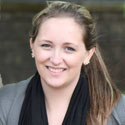
Graduate Student, Coastal Carolina University
Charlotte is currently at Coastal Carolina University in their Coastal Marine and Wetland Studies graduate program. She works in the Groundwater Discharge Measurement Facility, as a member of Rick Peterson’s lab, where she studies submarine groundwater flows in bacterial mats on the sea floor using naturally occurring radium isotopes. Her thesis will focus on sediment data collected specifically in the Guaymas Basin region near hydrothermal vents. She has also used this method to study seafloor sediment in the Gulf of Mexico.
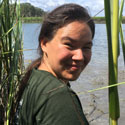
PhD Student, University of Georgia
Hannah Choi is a graduate student at the University of Georgia. She received her B.A. in biology from Reed College, where she spent her time studying symbiotic nitrogen fixation in cycads and facilitating student research projects at the college’s TRIGA Mark I nuclear reactor. She became interested in oceanography while working as a deckhand with the Los Angeles Maritime Institute. Aboard their 100 foot brigantine, the Irving Johnson, she explored the Channel Islands and taught middle and high school students how to sail. Now, she is in her third year in the Joye group at the University of Georgia, where she works on pelagic methanotrophy in the Gulf of Mexico and the Gulf of California. On this cruise, she is excited to bring this work to the bubble plumes of the Atlantic.
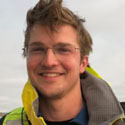
Research Technician, University of Georgia
Josh Parris is a research technician with the Joye Lab at the University of Georgia. Josh graduated from Georgia State University with a B.S. in Geology. Soon after, Josh interned with the U.S. Geological Survey working in the Water Resources Division alongside many staff scientists researching environmental contaminant and pollutant transport. Since joining the Joye Lab, Josh has started analysis of organic extracts from environmental samples to acquire characterizations of petroleum hydrocarbons. This will be Josh’s first cruise with the Joye Lab and he is very excited to be involved in such impactful oceanographic research.
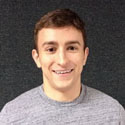
Research Technician, University of Georgia
Zac is a research technician in the Joye Research Group at the University of Georgia. He earned a B.S. in Biology and a M.S. in the Biological Sciences from Youngstown State University in 2015 and 2017 respectively. He's interested in studying microorganisms that inhabit methane-rich environments, especially those involved in the anaerobic oxidation of methane.
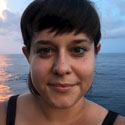
Operations Coordinator, NOAA Office of Ocean Exploration and Research
Caitlin Adams is an operations coordinator with NOAA’s Office of Ocean Exploration and Research. When not supporting the DEEP SEARCH project as NOAA’s primary representative, she focuses on organizing OER’s ASPIRE campaign, coordinating ship time needs across the office, and planning and tracking OER’s non-Okeanos Explorer projects. Before joining OER, she worked at the National Oceanographic Partnership Program, where she facilitated interagency ocean research, including the previous iteration of the BOEM-USGS-NOAA partnership, and met a number of her current colleagues. She holds a Master of Environmental Management degree from Duke University and Bachelor of Arts degree in biology from Swarthmore College. In a previous life, she worked as a biomedical researcher in New York City, which gave her a lifelong appreciation for molecular biology but not nearly enough opportunities for field work.
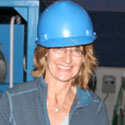
Associate Research Faculty, Florida State University Coastal and Marine Lab
Sandra Brooke’s career in the deep sea began with her Ph.D., which was a joint venture between Harbor Branch Oceanographic in Florida, and Southampton Oceanography Center in England. She has since worked on deep-water coral ecosystems in the Aleutian Islands of Alaska, the Norwegian Fjords, the Western Atlantic Margin and Gulf of Mexico. She has also worked on chemosynthetic ecosystems, most recently the newly discovered methane seeps of the mid-Atlantic Bight. Corals are important components of deep-sea hard-bottom habitats and like their shallow counterparts they are being impacted by various human activities. Her research focus is on understanding their distribution, life history strategies and physiology, particularly how they respond to environmental stressors. Sandra also works with Federal agencies and conservation entities to connect scientific information to the policy and outreach arenas. These efforts have contributed to protection of vast areas of deep coral habitats along the US Atlantic coast. Through the DEEP SEARCH project, she will continue her research on life histories and physiology of deep corals, some of which form reefs and others that colonize rocky habitats, and cold seep fauna. The information generated by the DEEP SEARCH project will continue to protect vulnerable deep sea communities from human activities.
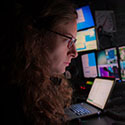
Postdoctoral Researcher, Harvey Mudd College
Andrea is currently a postdoctoral researcher at Harvey Mudd College and a co-PI on the DEEP SEARCH project. Andrea holds a PhD in Biology from Temple University and an MS in Marine Biology from the University of North Carolina Wilmington. Since 2002, Andrea has participated in 24 research cruises using deep-submergence vehicles. She also has extensive experience with deep-coral communities in the southeast U.S region. Broadly, Andrea is interested in how biodiversity is generated and maintained in the deep sea. Specifically, she focuses on the relative roles of environmental heterogeneity and dispersal in shaping deep-sea coral and fish communities. During DEEP SEARCH, Andrea is focused on understanding the functional diversity of fishes in deep-sea habitats and whether environmental heterogeneity structures populations of foundation species and their symbionts along the U.S. eastern seaboard.
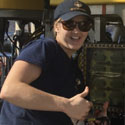
ROV JASON Team, Woods Hole Oceanographic Institution
Summer Farrell is a ROV Pilot/Technician contractor. She has a B.A. in Marine Affairs - University of Miami 2012 and an A.S. in Engineering Technology. The first professional step she took into her ocean-related career path was volunteering at the Bimini Biological Field Station "Shark Lab" in the Bahamas while at the University of Miami. She assisted with and studied lemon shark behavior & population studies, along with the ecology assessment in that area. With an interest in technology and electronics, she became a submarine technician, ROV technician/pilot, small boat captain, and a multi-engine rated Instrument pilot (recreationally). Flying a plane and flying an ROV have many similar attributes and challenges that she enjoys. She has worked for Ocean Exploration Trust over the course of 5 years as an ROV Pilot/tech and is currently a contractor with Woods Hole Oceanographic Institution.
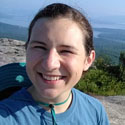
Software Engineer, Woods Hole Oceanographic Institution
Jennifer Vaccaro is a software engineer for the WHOI Deep Submergence Lab. She studied Electrical and Computer Engineering at Olin College of Engineering in Needham, MA. Past projects include device drivers for the AUV Sentry software overhaul last spring, and the redesign of the NDSF vehicle software for displaying subsea navigation (NavG). On this cruise, her first with ROV Jason, she will be focused on the data post-processing toolchain.
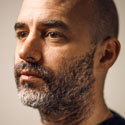
Filmmaker
Ivan Hurzeler makes movies about people fighting the odds. He began his career as a video artist, producing work for galleries and art fairs in New York City and around the world. He ventured into narrative work by directing the short film “Famous Person Talent Agency”, selected for the Sundance Film Festival. From there, he worked in documentary covering a range of subjects from the devastation of Hurricane Sandy, to the Indy 500 for clients such as Con Edison, MOMA Los Angeles and Verizon. Ivan's documentary feature Acid Horizon premiered at the 2018 Santa Barbara International Film Festival, and was released in the Fall of 2018.